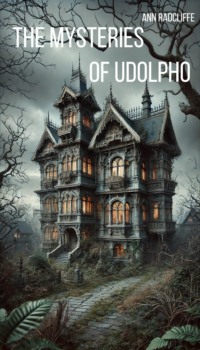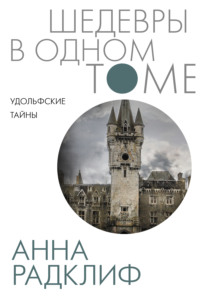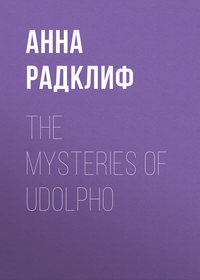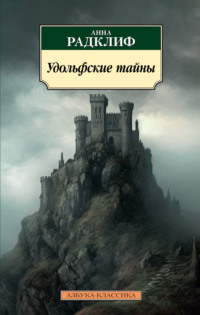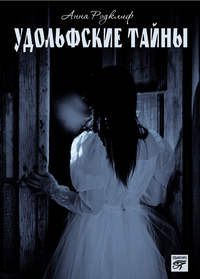 полная версия
полная версияA Sicilian Romance
CHAPTER III
The castle was buried in sleep when Ferdinand again joined his sisters in madame's apartment. With anxious curiosity they followed him to the chamber. The room was hung with tapestry. Ferdinand carefully sounded the wall which communicated with the southern buildings. From one part of it a sound was returned, which convinced him there was something less solid than stone. He removed the tapestry, and behind it appeared, to his inexpressible satisfaction, a small door. With a hand trembling through eagerness, he undrew the bolts, and was rushing forward, when he perceived that a lock withheld his passage. The keys of madame and his sisters were applied in vain, and he was compelled to submit to disappointment at the very moment when he congratulated himself on success, for he had with him no means of forcing the door.
He stood gazing on the door, and inwardly lamenting, when a low hollow sound was heard from beneath. Emilia and Julia seized his arm; and almost sinking with apprehension, listened in profound silence. A footstep was distinctly heard, as if passing through the apartment below, after which all was still. Ferdinand, fired by this confirmation of the late report, rushed on to the door, and again tried to burst his way, but it resisted all the efforts of his strength. The ladies now rejoiced in that circumstance which they so lately lamented; for the sounds had renewed their terror, and though the night passed without further disturbance, their fears were very little abated.
Ferdinand, whose mind was wholly occupied with wonder, could with difficulty await the return of night. Emilia and Julia were scarcely less impatient. They counted the minutes as they passed; and when the family retired to rest, hastened with palpitating hearts to the apartment of madame. They were soon after joined by Ferdinand, who brought with him tools for cutting away the lock of the door. They paused a few moments in the chamber in fearful silence, but no sound disturbed the stillness of night. Ferdinand applied a knife to the door, and in a short time separated the lock. The door yielded, and disclosed a large and gloomy gallery. He took a light. Emilia and Julia, fearful of remaining in the chamber, resolved to accompany him, and each seizing an arm of madame, they followed in silence. The gallery was in many parts falling to decay, the ceiling was broke, and the window-shutters shattered, which, together with the dampness of the walls, gave the place an air of wild desolation.
They passed lightly on, for their steps ran in whispering echoes through the gallery, and often did Julia cast a fearful glance around.
The gallery terminated in a large old stair-case, which led to a hall below; on the left appeared several doors which seemed to lead to separate apartments. While they hesitated which course to pursue, a light flashed faintly up the stair-case, and in a moment after passed away; at the same time was heard the sound of a distant footstep. Ferdinand drew his sword and sprang forward; his companions, screaming with terror, ran back to madame's apartment.
Ferdinand descended a large vaulted hall; he crossed it towards a low arched door, which was left half open, and through which streamed a ray of light. The door opened upon a narrow winding passage; he entered, and the light retiring, was quickly lost in the windings of the place. Still he went on. The passage grew narrower, and the frequent fragments of loose stone made it now difficult to proceed. A low door closed the avenue, resembling that by which he had entered. He opened it, and discovered a square room, from whence rose a winding stair-case, which led up the south tower of the castle. Ferdinand paused to listen; the sound of steps was ceased, and all was profoundly silent. A door on the right attracted his notice; he tried to open it, but it was fastened. He concluded, therefore, that the person, if indeed a human being it was that bore the light he had seen, had passed up the tower. After a momentary hesitation, he determined to ascend the stair-case, but its ruinous condition made this an adventure of some difficulty. The steps were decayed and broken, and the looseness of the stones rendered a footing very insecure. Impelled by an irresistible curiosity, he was undismayed, and began the ascent. He had not proceeded very far, when the stones of a step which his foot had just quitted, loosened by his weight, gave way; and dragging with them those adjoining, formed a chasm in the stair-case that terrified even Ferdinand, who was left tottering on the suspended half of the steps, in momentary expectation of falling to the bottom with the stone on which he rested. In the terror which this occasioned, he attempted to save himself by catching at a kind of beam which projected over the stairs, when the lamp dropped from his hand, and he was left in total darkness. Terror now usurped the place of every other interest, and he was utterly perplexed how to proceed. He feared to go on, lest the steps above, as infirm as those below, should yield to his weight;—to return was impracticable, for the darkness precluded the possibility of discovering a means. He determined, therefore, to remain in this situation till light should dawn through the narrow grates in the walls, and enable him to contrive some method of letting himself down to the ground.
He had remained here above an hour, when he suddenly heard a voice from below. It seemed to come from the passage leading to the tower, and perceptibly drew nearer. His agitation was now extreme, for he had no power of defending himself, and while he remained in this state of torturing expectation, a blaze of light burst upon the stair-case beneath him. In the succeeding moment he heard his own name sounded from below. His apprehensions instantly vanished, for he distinguished the voices of madame and his sisters.
They had awaited his return in all the horrors of apprehension, till at length all fear for themselves was lost in their concern for him; and they, who so lately had not dared to enter this part of the edifice, now undauntedly searched it in quest of Ferdinand. What were their emotions when they discovered his perilous situation!
The light now enabled him to take a more accurate survey of the place. He perceived that some few stones of the steps which had fallen still remained attached to the wall, but he feared to trust to their support only. He observed, however, that the wall itself was partly decayed, and consequently rugged with the corners of half-worn stones. On these small projections he contrived, with the assistance of the steps already mentioned, to suspend himself, and at length gained the unbroken part of the stairs in safety. It is difficult to determine which individual of the party rejoiced most at this escape. The morning now dawned, and Ferdinand desisted for the present from farther enquiry.
The interest which these mysterious circumstances excited in the mind of Julia, had withdrawn her attention from a subject more dangerous to its peace. The image of Vereza, notwithstanding, would frequently intrude upon her fancy; and, awakening the recollection of happy emotions, would call forth a sigh which all her efforts could not suppress. She loved to indulge the melancholy of her heart in the solitude of the woods. One evening she took her lute to a favorite spot on the seashore, and resigning herself to a pleasing sadness, touched some sweet and plaintive airs. The purple flush of evening was diffused over the heavens. The sun, involved in clouds of splendid and innumerable hues, was setting o'er the distant waters, whose clear bosom glowed with rich reflection. The beauty of the scene, the soothing murmur of the high trees, waved by the light air which overshadowed her, and the soft shelling of the waves that flowed gently in upon the shores, insensibly sunk her mind into a state of repose. She touched the chords of her lute in sweet and wild melody, and sung the following ode:
EVENINGEvening veil'd in dewy shades, Slowly sinks upon the main;See th'empurpled glory fades, Beneath her sober, chasten'd reign.Around her car the pensive Hours, In sweet illapses meet the sight,Crown'd their brows with closing flow'rs Rich with chrystal dews of night.Her hands, the dusky hues arrange O'er the fine tints of parting day;Insensibly the colours change, And languish into soft decay.Wide o'er the waves her shadowy veil she draws. As faint they die along the distant shores;Through the still air I mark each solemn pause, Each rising murmur which the wild wave pours.A browner shadow spreads upon the air, And o'er the scene a pensive grandeur throws;The rocks—the woods a wilder beauty wear, And the deep wave in softer music flows;And now the distant view where vision fails, Twilight and grey obscurity pervade;Tint following tint each dark'ning object veils, Till all the landscape sinks into the shade.Oft from the airy steep of some lone hill, While sleeps the scene beneath the purple glow:And evening lives o'er all serene and still, Wrapt let me view the magic world below!And catch the dying gale that swells remote, That steals the sweetness from the shepherd's flute:The distant torrent's melancholy note And the soft warblings of the lover's lute.Still through the deep'ning gloom of bow'ry shades To Fancy's eye fantastic forms appear;Low whisp'ring echoes steal along the glades And thrill the ear with wildly-pleasing fear.Parent of shades!—of silence!—dewy airs! Of solemn musing, and of vision wild!To thee my soul her pensive tribute bears, And hails thy gradual step, thy influence mild.Having ceased to sing, her fingers wandered over the lute in melancholy symphony, and for some moments she remained lost in the sweet sensations which the music and the scenery had inspired. She was awakened from her reverie, by a sigh that stole from among the trees, and directing her eyes whence it came, beheld—Hippolitus! A thousand sweet and mingled emotions pressed upon her heart, yet she scarcely dared to trust the evidence of sight. He advanced, and throwing himself at her feet: 'Suffer me,' said he, in a tremulous voice, 'to disclose to you the sentiments which you have inspired, and to offer you the effusions of a heart filled only with love and admiration.' 'Rise, my lord,' said Julia, moving from her seat with an air of dignity, 'that attitude is neither becoming you to use, or me to suffer. The evening is closing, and Ferdinand will be impatient to see you.'
'Never will I rise, madam,' replied the count, with an impassioned air, 'till'—He was interrupted by the marchioness, who at this moment entered the grove. On observing the position of the count she was retiring. 'Stay, madam,' said Julia, almost sinking under her confusion. 'By no means,' replied the marchioness, in a tone of irony, 'my presence would only interrupt a very agreeable scene. The count, I see, is willing to pay you his earliest respects.' Saying this she disappeared, leaving Julia distressed and offended, and the count provoked at the intrusion. He attempted to renew the subject, but Julia hastily followed the steps of the marchioness, and entered the castle.
The scene she had witnessed, raised in the marchioness a tumult of dreadful emotions. Love, hatred, and jealousy, raged by turns in her heart, and defied all power of controul. Subjected to their alternate violence, she experienced a misery more acute than any she had yet known. Her imagination, invigorated by opposition, heightened to her the graces of Hippolitus; her bosom glowed with more intense passion, and her brain was at length exasperated almost to madness.
In Julia this sudden and unexpected interview excited a mingled emotion of love and vexation, which did not soon subside. At length, however, the delightful consciousness of Vereza's love bore her high above every other sensation; again the scene more brightly glowed, and again her fancy overcame the possibility of evil.
During the evening a tender and timid respect distinguished the behaviour of the count towards Julia, who, contented with the certainty of being loved, resolved to conceal her sentiments till an explanation of his abrupt departure from Mazzini, and subsequent absence, should have dissipated the shadow of mystery which hung over this part of his conduct. She observed that the marchioness pursued her with steady and constant observation, and she carefully avoided affording the count an opportunity of renewing the subject of the preceding interview, which, whenever he approached her, seemed to tremble on his lips.
Night returned, and Ferdinand repaired to the chamber of Julia to pursue his enquiry. Here he had not long remained, when the strange and alarming sounds which had been heard on the preceding night were repeated. The circumstance that now sunk in terror the minds of Emilia and Julia, fired with new wonder that of Ferdinand, who seizing a light, darted through the discovered door, and almost instantly disappeared.
He descended into the same wild hall he had passed on the preceding night. He had scarcely reached the bottom of the stair-case, when a feeble light gleamed across the hall, and his eye caught the glimpse of a figure retiring through the low arched door which led to the south tower. He drew his sword and rushed on. A faint sound died away along the passage, the windings of which prevented his seeing the figure he pursued. Of this, indeed, he had obtained so slight a view, that he scarcely knew whether it bore the impression of a human form. The light quickly disappeared, and he heard the door that opened upon the tower suddenly close. He reached it, and forcing it open, sprang forward; but the place was dark and solitary, and there was no appearance of any person having passed along it. He looked up the tower, and the chasm which the stair-case exhibited, convinced him that no human being could have passed up. He stood silent and amazed; examining the place with an eye of strict enquiry, he perceived a door, which was partly concealed by hanging stairs, and which till now had escaped his notice. Hope invigorated curiosity, but his expectation was quickly disappointed, for this door also was fastened. He tried in vain to force it. He knocked, and a hollow sullen sound ran in echoes through the place, and died away at a distance. It was evident that beyond this door were chambers of considerable extent, but after long and various attempts to reach them, he was obliged to desist, and he quitted the tower as ignorant and more dissatisfied than he had entered it. He returned to the hall, which he now for the first time deliberately surveyed. It was a spacious and desolate apartment, whose lofty roof rose into arches supported by pillars of black marble. The same substance inlaid the floor, and formed the stair-case. The windows were high and gothic. An air of proud sublimity, united with singular wildness, characterized the place, at the extremity of which arose several gothic arches, whose dark shade veiled in obscurity the extent beyond. On the left hand appeared two doors, each of which was fastened, and on the right the grand entrance from the courts. Ferdinand determined to explore the dark recess which terminated his view, and as he traversed the hall, his imagination, affected by the surrounding scene, often multiplied the echoes of his footsteps into uncertain sounds of strange and fearful import.
He reached the arches, and discovered beyond a kind of inner hall, of considerable extent, which was closed at the farther end by a pair of massy folding-doors, heavily ornamented with carving. They were fastened by a lock, and defied his utmost strength.
As he surveyed the place in silent wonder, a sullen groan arose from beneath the spot where he stood. His blood ran cold at the sound, but silence returning, and continuing unbroken, he attributed his alarm to the illusion of a fancy, which terror had impregnated. He made another effort to force the door, when a groan was repeated more hollow, and more dreadful than the first. At this moment all his courage forsook him; he quitted the door, and hastened to the stair-case, which he ascended almost breathless with terror.
He found Madame de Menon and his sisters awaiting his return in the most painful anxiety; and, thus disappointed in all his endeavours to penetrate the secret of these buildings, and fatigued with fruitless search, he resolved to suspend farther enquiry.
When he related the circumstances of his late adventure, the terror of Emilia and Julia was heightened to a degree that overcame every prudent consideration. Their apprehension of the marquis's displeasure was lost in a stronger feeling, and they resolved no longer to remain in apartments which offered only terrific images to their fancy. Madame de Menon almost equally alarmed, and more perplexed, by this combination of strange and unaccountable circumstances, ceased to oppose their design. It was resolved, therefore, that on the following day madame should acquaint the marchioness with such particulars of the late occurrence as their purpose made it necessary she should know, concealing their knowledge of the hidden door, and the incidents immediately dependant on it; and that madame should entreat a change of apartments.
Madame accordingly waited on the marchioness. The marchioness having listened to the account at first with surprise, and afterwards with indifference, condescended to reprove madame for encouraging superstitious belief in the minds of her young charge. She concluded with ridiculing as fanciful the circumstances related, and with refusing, on account of the numerous visitants at the castle, the request preferred to her.
It is true the castle was crowded with visitors; the former apartments of Madame de Menon were the only ones unoccupied, and these were in magnificent preparation for the pleasure of the marchioness, who was unaccustomed to sacrifice her own wishes to the comfort of those around her. She therefore treated lightly the subject, which, seriously attended to, would have endangered her new plan of delight.
But Emilia and Julia were too seriously terrified to obey the scruples of delicacy, or to be easily repulsed. They prevailed on Ferdinand to represent their situation to the marquis.
Meanwhile Hippolitus, who had passed the night in a state of sleepless anxiety, watched, with busy impatience, an opportunity of more fully disclosing to Julia the passion which glowed in his heart. The first moment in which he beheld her, had awakened in him an admiration which had since ripened into a sentiment more tender. He had been prevented formally declaring his passion by the circumstance which so suddenly called him to Naples. This was the dangerous illness of the Marquis de Lomelli, his near and much-valued relation. But it was a task too painful to depart in silence, and he contrived to inform Julia of his sentiments in the air which she heard so sweetly sung beneath her window.
When Hippolitus reached Naples, the marquis was yet living, but expired a few days after his arrival, leaving the count heir to the small possessions which remained from the extravagance of their ancestors.
The business of adjusting his rights had till now detained him from Sicily, whither he came for the sole purpose of declaring his love. Here unexpected obstacles awaited him. The jealous vigilance of the marchioness conspired with the delicacy of Julia, to withhold from him the opportunity he so anxiously sought.
When Ferdinand entered upon the subject of the southern buildings to the marquis, he carefully avoided mentioning the hidden door. The marquis listened for some time to the relation in gloomy silence, but at length assuming an air of displeasure, reprehended Ferdinand for yielding his confidence to those idle alarms, which he said were the suggestions of a timid imagination. 'Alarms,' continued he, 'which will readily find admittance to the weak mind of a woman, but which the firmer nature of man should disdain.—Degenerate boy! Is it thus you reward my care? Do I live to see my son the sport of every idle tale a woman may repeat? Learn to trust reason and your senses, and you will then be worthy of my attention.'
The marquis was retiring, and Ferdinand now perceived it necessary to declare, that he had himself witnessed the sounds he mentioned. 'Pardon me, my lord,' said he, 'in the late instance I have been just to your command—my senses have been the only evidences I have trusted. I have heard those sounds which I cannot doubt.' The marquis appeared shocked. Ferdinand perceived the change, and urged the subject so vigorously, that the marquis, suddenly assuming a look of grave importance, commanded him to attend him in the evening in his closet.
Ferdinand in passing from the marquis met Hippolitus. He was pacing the gallery in much seeming agitation, but observing Ferdinand, he advanced to him. 'I am ill at heart,' said he, in a melancholy tone, 'assist me with your advice. We will step into this apartment, where we can converse without interruption.'
'You are not ignorant,' said he, throwing himself into a chair, 'of the tender sentiments which your sister Julia has inspired. I entreat you by that sacred friendship which has so long united us, to afford me an opportunity of pleading my passion. Her heart, which is so susceptible of other impressions, is, I fear, insensible to love. Procure me, however, the satisfaction of certainty upon a point where the tortures of suspence are surely the most intolerable.'
'Your penetration,' replied Ferdinand, 'has for once forsaken you, else you would now be spared the tortures of which you complain, for you would have discovered what I have long observed, that Julia regards you with a partial eye.'
'Do not,' said Hippolitus, 'make disappointment more terrible by flattery; neither suffer the partiality of friendship to mislead your judgment. Your perceptions are affected by the warmth of your feelings, and because you think I deserve her distinction, you believe I possess it. Alas! you deceive yourself, but not me!'
'The very reverse,' replied Ferdinand; 'tis you who deceive yourself, or rather it is the delicacy of the passion which animates you, and which will ever operate against your clear perception of a truth in which your happiness is so deeply involved. Believe me, I speak not without reason:—she loves you.'
At these words Hippolitus started from his seat, and clasping his hands in fervent joy, 'Enchanting sounds!' cried he, in a voice tenderly impassioned; 'could I but believe ye!—could I but believe ye-this world were paradise!'
During this exclamation, the emotions of Julia, who sat in her closet adjoining, can with difficulty be imagined. A door which opened into it from the apartment where this conversation was held, was only half closed. Agitated with the pleasure this declaration excited, she yet trembled with apprehension lest she should be discovered. She hardly dared to breathe, much less to move across the closet to the door, which opened upon the gallery, whence she might probably have escaped unnoticed, lest the sound of her step should betray her. Compelled, therefore, to remain where she was, she sat in a state of fearful distress, which no colour of language can paint.
'Alas!' resumed Hippolitus, 'I too eagerly admit the possibility of what I wish. If you mean that I should really believe you, confirm your assertion by some proof.'—'Readily,' rejoined Ferdinand.
The heart of Julia beat quick.
'When you was so suddenly called to Naples upon the illness of the Marquis Lomelli, I marked her conduct well, and in that read the sentiments of her heart. On the following morning, I observed in her countenance a restless anxiety which I had never seen before. She watched the entrance of every person with an eager expectation, which was as often succeeded by evident disappointment. At dinner your departure was mentioned:—she spilt the wine she was carrying to her lips, and for the remainder of the day was spiritless and melancholy. I saw her ineffectual struggles to conceal the oppression at her heart. Since that time she has seized every opportunity of withdrawing from company. The gaiety with which she was so lately charmed—charmed her no longer; she became pensive, retired, and I have often heard her singing in some lonely spot, the most moving and tender airs. Your return produced a visible and instantaneous alteration; she has now resumed her gaiety; and the soft confusion of her countenance, whenever you approach, might alone suffice to convince you of the truth of my assertion.'



